Allauddin’s Briyani and Islamic Restaurant: 2 biryani brands built on a grandfather’s story
GOLD 905 DJ Denise Tan delves into the diverse flavours of mixed spiced rice from two family-owned brands, tracing their journeys from immigrant roots to established names in Singapore’s food history.
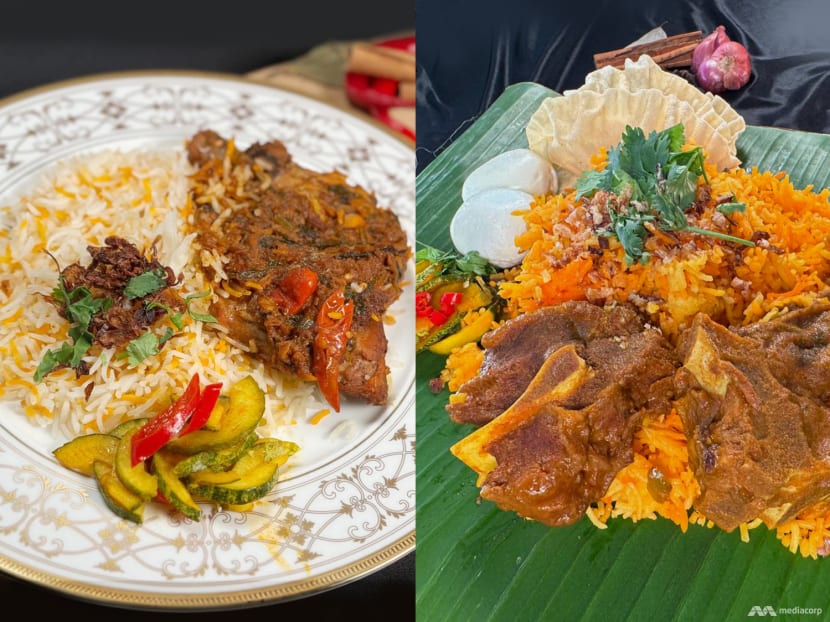
Islamic Restaurant's chicken biryani and Allauddin's Briyani’s mutton biryani. (Photos: Mediacorp)

This audio is generated by an AI tool.
Biryani, briyani, biriyani, beryani. In Singapore, there are at least as many variations of the popular Indian-Muslim rice dish as there are ways to spell it and I got to experience two very different versions thanks to my Makan Kaki, content creator and Mediacorp Ria 89.7 DJ Zuhairi Idris.
ALLAUDDIN’S BRIYANI
Starting off at Little India landmark Tekka Centre, home to several famous biryani stalls, Zuhairi introduced me to one that has a 50-year-history and a Michelin Guide mention for “good food at a good price”. Accolades from the press and photos with past presidents adorn the signage of Allauddin’s Briyani in validation of their biryani "specialist” claim, so we were keen to find out what made it so special.
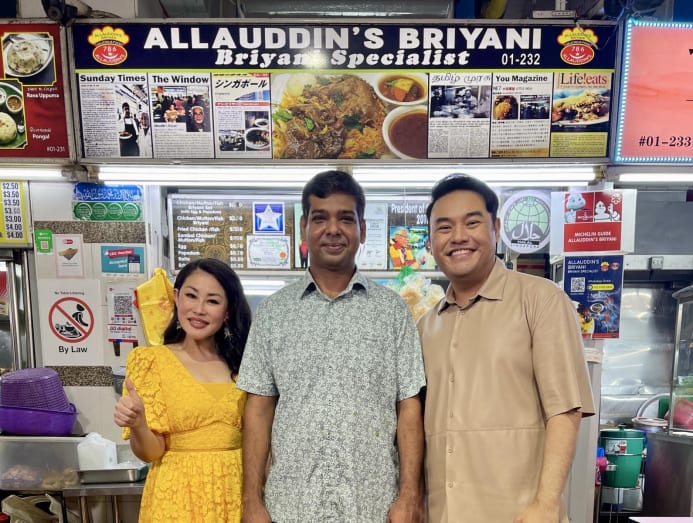
Named for his late father Shaikallauddin Mohamed, the second generation owner of Allauddin’s Briyani, Mr Haji Mohamed told us that their roots go back even further to the early 1940s when his grandfather first came to Singapore from India.
“My grandfather actually worked in a restaurant when he came and that restaurant was famous for biryani. My father joined him in the 1960s in the same restaurant. Then in the 1970s my father intended to open up his own business selling biryani and Indian food,” he said. Allauddin’s has since established itself as one of the best in Little India and expanded to several locations across the island, including Redhill and West Coast.
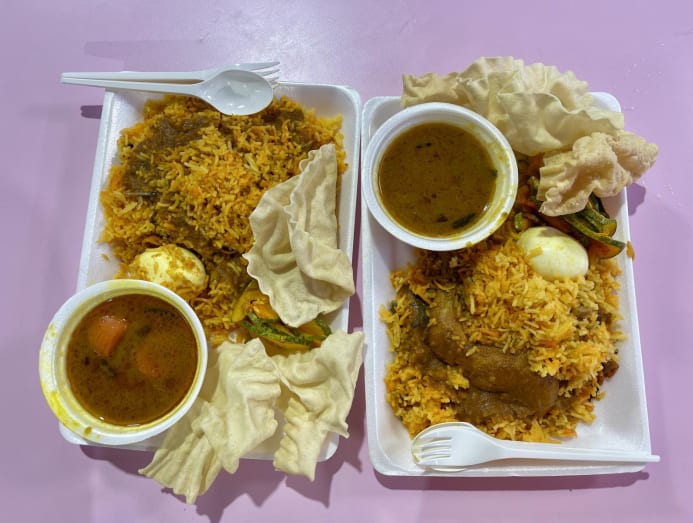
After his father retired, Mr Haji took over in 2000, carrying on the family tradition of serving “South-Indian style” biryani. “We actually cook for the locals. Like what people usually prefer. Not too spicy. Not too dry,” he shared. “We use the best quality and it's our own recipe. Spices, we grind ourselves and only our family knows how to do it.”
To keep up with expansion plans, the biryani is now prepared in a central kitchen, but the family spice blend is kept secret even from the cooks who work there. Mr Haji ensures he is on hand for quality checks and has standardised the way their biryani is served at every stall. Custom stainless-steel counters with built-in storage for rice, meats and condiments keep the food heated at a constant temperature for smoother service especially during peak hours.
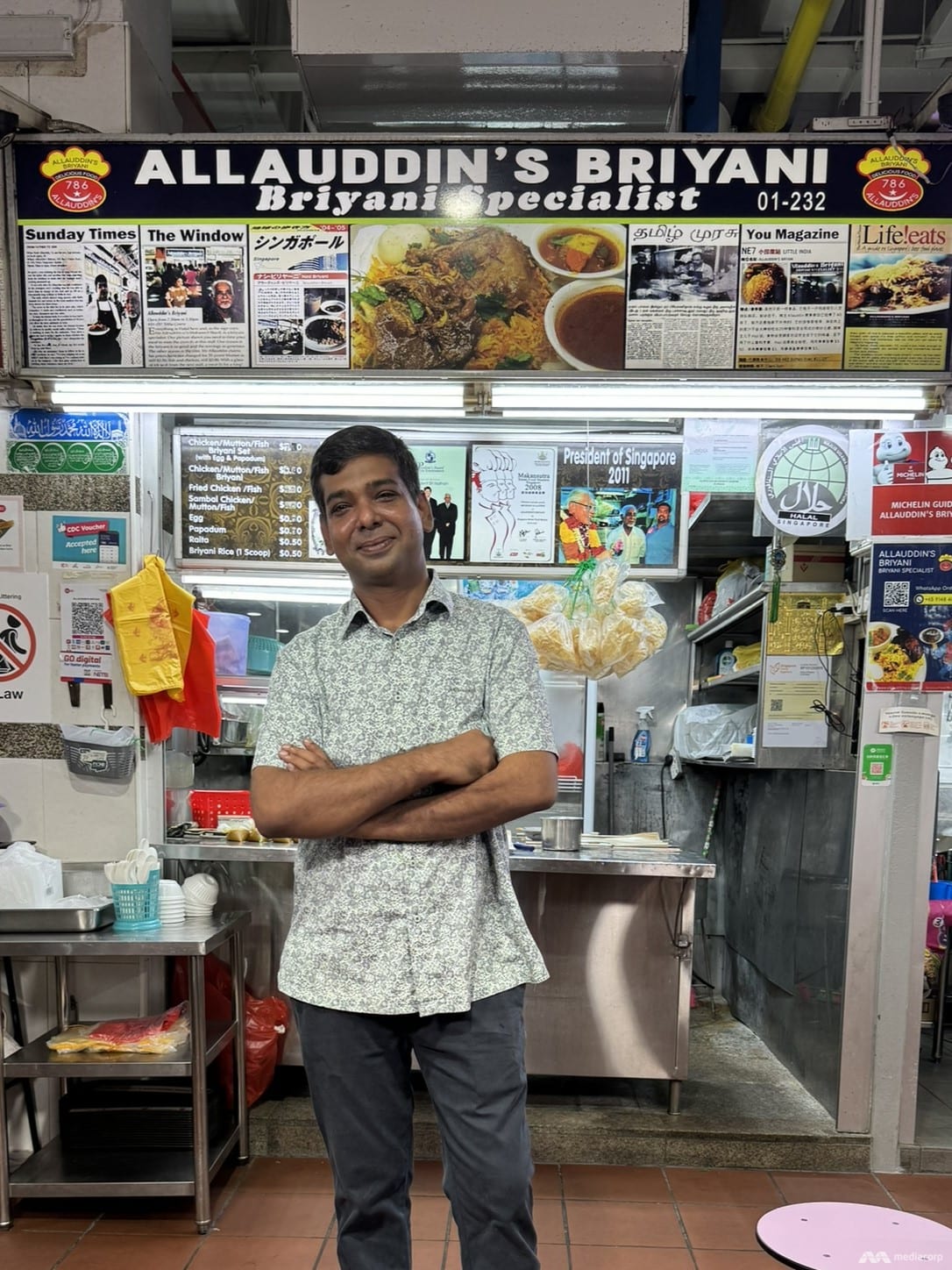
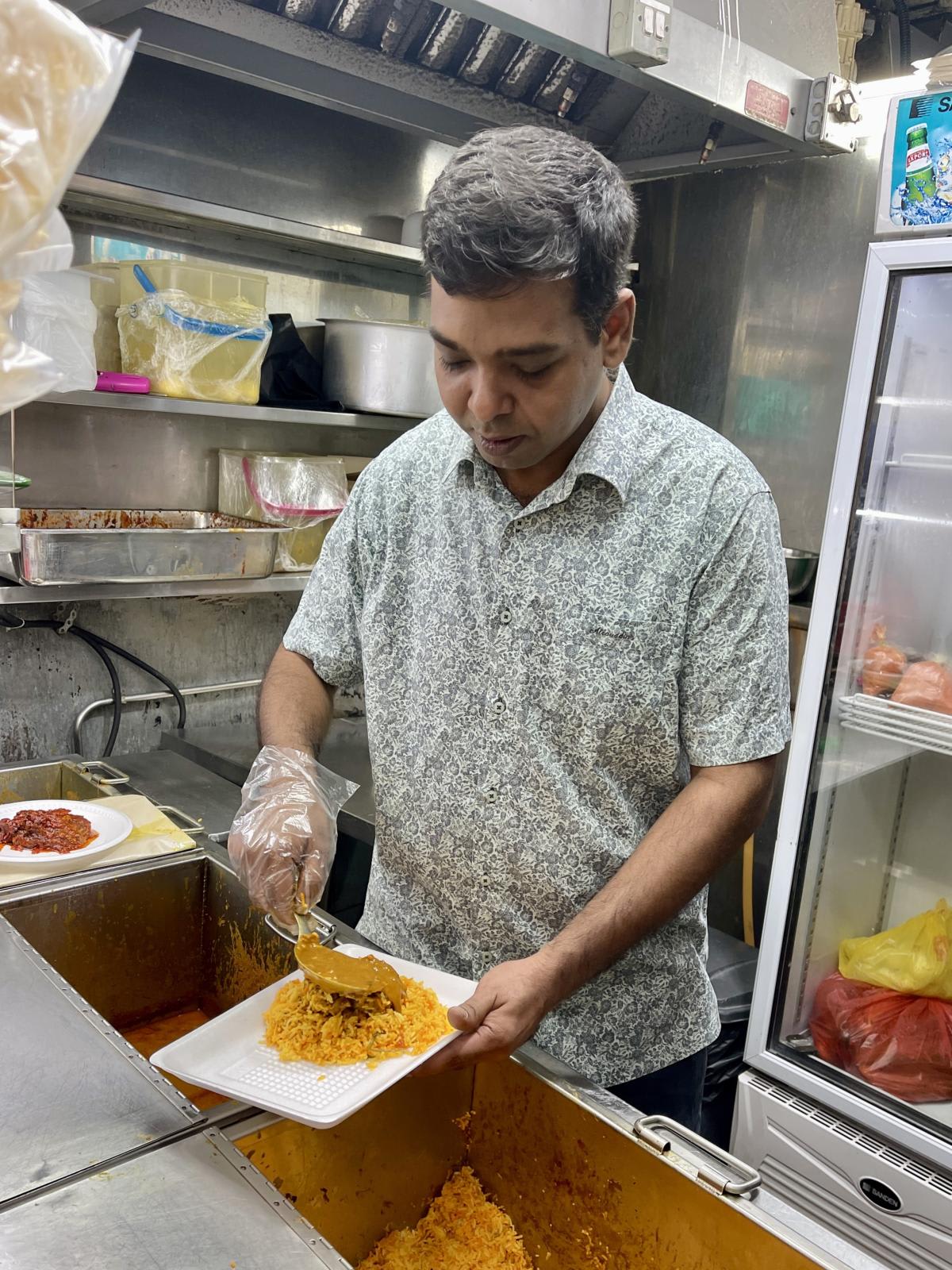
Even at 3pm, Zuhairi and I observed a steady stream of customers, so we hurried to put in an order with Mr Haji for two of their best-selling S$7 sets – chicken and mutton biryani (fish is also available) – which come with rice, meat, dalcha, achar, hard-boiled egg and papadum.
A heady, spice-laden aroma reached our table before the food did, making my mouth water. I knew this was going to be a meal that would pull no punches. Lavishly seasoned, generously portioned, the biryani was exactly the robust, stick-to-the-ribs kind I know and love.
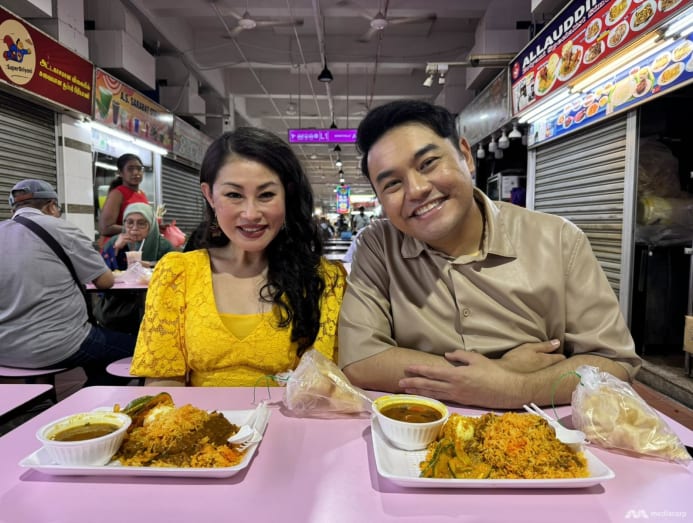
Mr Haji’s description had been spot-on. “It's not that spicy. But it's just nice. And I love the fact that the rice is a bit moist,” Zuhairi said. Indeed, the yellow-orange grains were plump and tender, especially after being bathed in ample ladles of curry and dalcha (lentil stew with carrot and potato).
The achar (pickled cucumber) took both Zuhairi and me by surprise, each for different reasons. Expecting a sweet and sour crunch, I enjoyed its saltiness, but he found it too intense. Though when eaten with rice and the plain hard-boiled egg, the flavours balanced out for him.
Our opinions were also split when it came to the meats. Zuhairi isn’t too fond of mutton because of its gaminess but was willing to give it a try. “I can't deny that I kind of love the mutton gravy. Mutton itself is not really for me, but the tenderness of the meat, I appreciate it”, was his verdict.
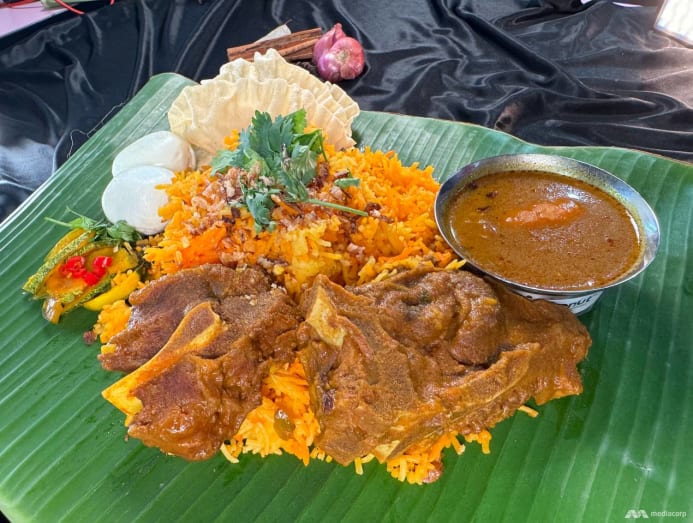
I was happy to hijack the entire plate for myself, relishing the rich gravy and funk of the bone-in meat. Each component of the set was crucial for balance – with spiced basmati rice as the foundational linchpin; tangy pickle cut the fattiness; dalcha added an earthy, soupy dimension; egg bulked up the proteins and papadum contrasted texture with crunch.
I also appreciated that the papadum was served separately in a bag. This helped the spiced crackers keep their crispiness because exposure to any hint of moisture makes them wilt. I learnt this the hard way by leaving a piece exposed on my gravy-soaked rice. Wiser the second time round, a sturdy curved piece could be used as an edible spoon to scoop up a little bit of everything for that perfect bite.
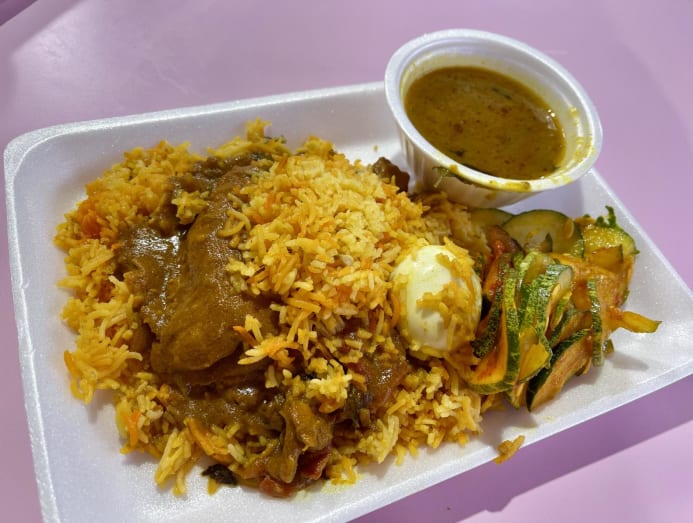
As for the chicken, Zuhairi and I were in total agreement. The fork-tender meat was extravagantly seasoned and down-to-the-bone delicious. “Eating this is exciting because there’re a lot of things going on in your mouth,” he said approvingly. To us, Allauddin’s Briyani was an all-round classic – hearty, familiar and deeply satisfying.
ISLAMIC RESTAURANT
For a double dose of biryani, our next famous-name destination, with more than a century of history in Singapore, was Islamic Restaurant along North Bridge Road. The 103-year-old institution was founded in 1921 by Mr M Abdul Rahiman, who was once a chef for the renowned Alsagoff trading family.
He learnt to cook under the tutelage of a Turkish head chef, which accounts for Islamic Restaurant’s unique biryani, or in this case, beryani. The spelling quirk has been retained by his grandson and third generation owner Mr Kaliloor Rahaman, who is devoted to preserving his family’s rich legacy.
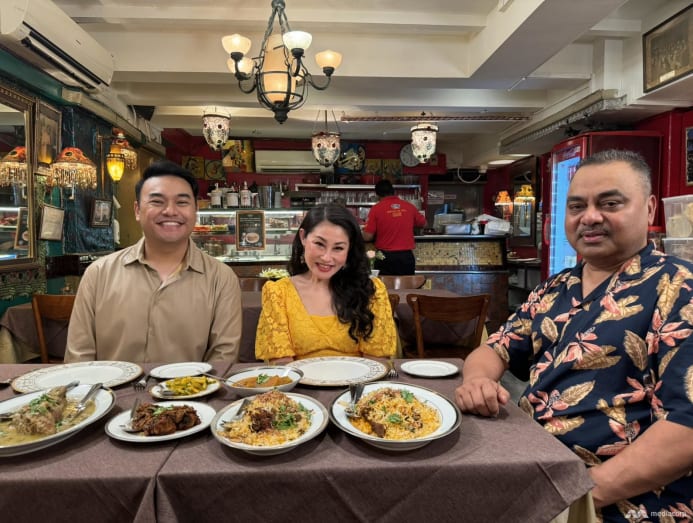
Referring to his grandfather’s early culinary pursuits, he said, “So from there he learned the trade, then he developed his recipe. The recipe is a combination of Indian and Turkish flavours. Most important for our brand is actually the mint leaves we get from three countries.”
Imported from Cameron Highlands in Malaysia, Thailand and Tasmania in Australia, the mint leaves perfumed the dish with a subtle freshness, contrasting with the deeply caramelised taste of fried shallots. Here and there, gentle hints of clove and cardamom also came through. The light touch with the seasonings made the rice no less flavourful and allowed its natural nutty, floral notes to shine, each long grain fluffy and distinct.
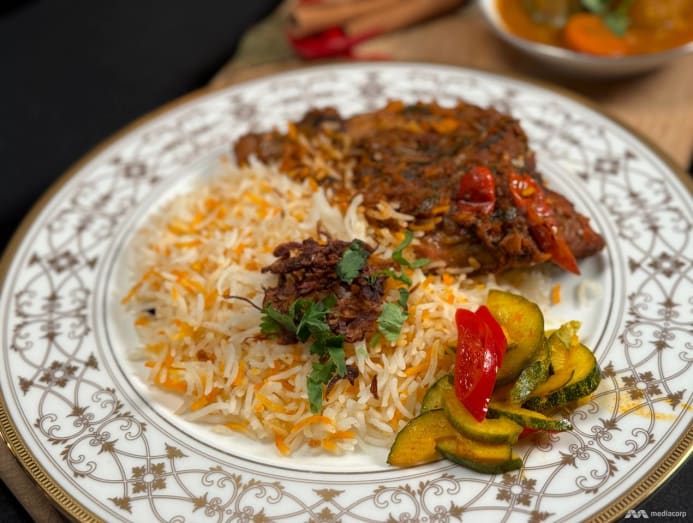
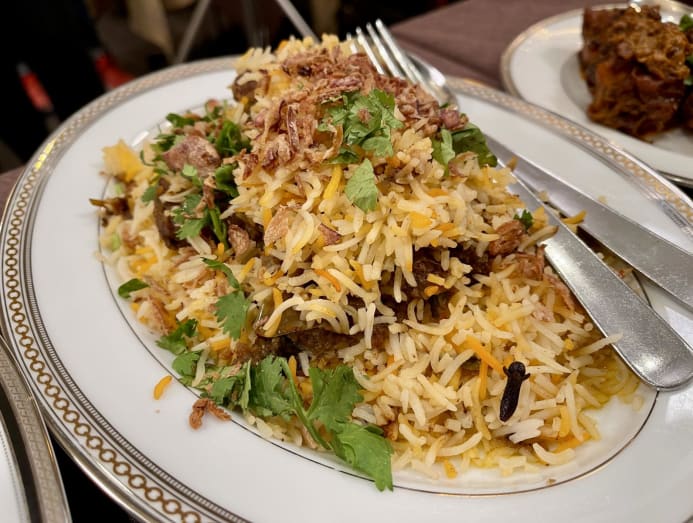
Zuhairi and I tried both the chicken and mutton versions of Islamic Restaurant’s biryani (S$14 and S$15 respectively). More like a dry curry presented on rice, both meats were tender and well-marinated, a thick, luscious coating clinging to each bone-in serving.
While the rice was delicate, the meats brought punchy flavours redolent with herbs and spices mixed according to grandpa’s secret recipe. “This of course is the family-kept secret which even the chef would not know. Even though it's a very simple recipe, it's a winning formula,” Mr Kalil said.
The most unexpected reaction came from Zuhairi who declared, “I never thought I would enjoy mutton. I think if I want to have mutton biryani, I’ll come to this place because it doesn’t taste gamey at all.”
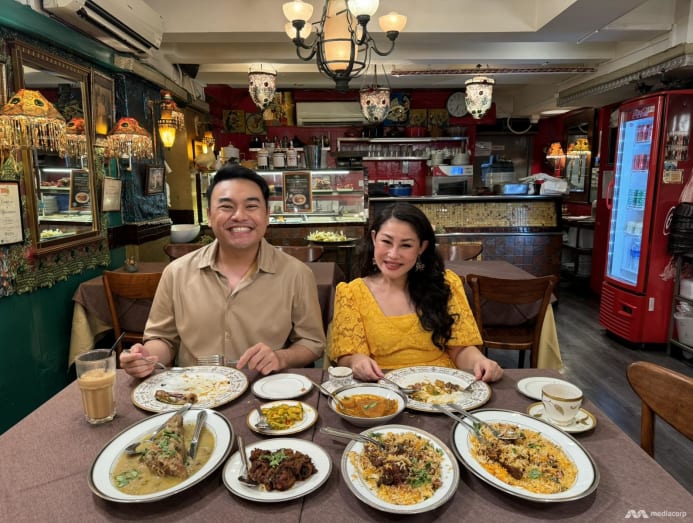
For those who prefer a “wetter” biryani, the thick dalcha made from lentils, brinjal, and carrot was an excellent side to drench the rice with. And the lightly spiced, sweet and sour cucumber achar brought juicy crunch. With influences and ingredients from around the world, Islamic Restaurant’s biryani was a plated holiday for our tastebuds. “This is very, very nice. Very light, not too heavy. Good,” Zuhairi concluded.
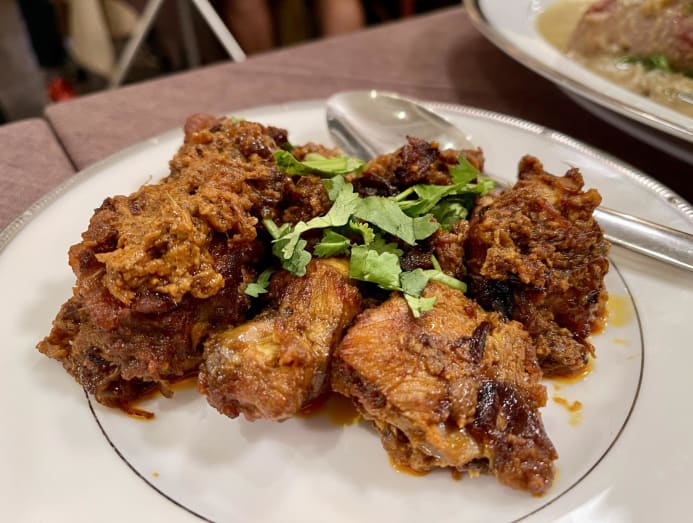
Just as well, because we were treated to three bonus dishes. Chicken Mysore (S$12) served savoury, concentrated flavour thanks to its marinade of chilli and turmeric powder; ginger and garlic paste; coconut and evaporated milk; as well as fried onions.
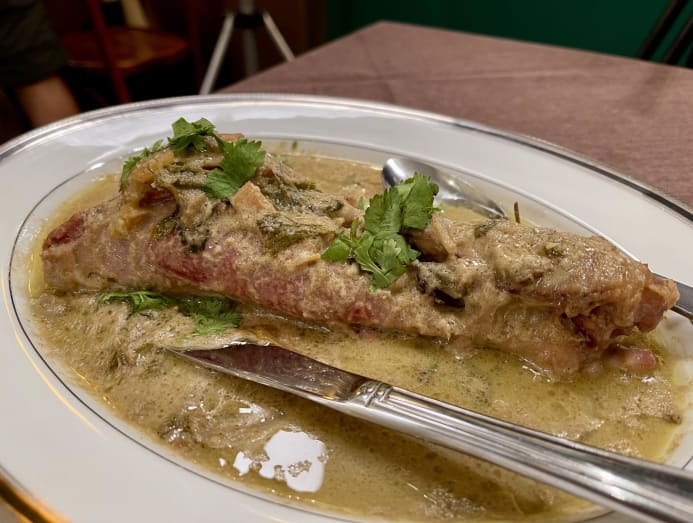
Next came the outstanding mutton samma (S$25) – whole lamb shank slathered in a creamy gravy similar to kurma and slow cooked for at least eight hours at a constant temperature of 70 degrees Celsius till pink and succulent. The tender, juicy meat was perfectly seasoned with the flavours of coriander, yoghurt and lots of white pepper for a mild, yet stimulating kick.
The intriguingly spicy sauce was so addictive, the final bonus dish, Roti Mariam (S$6), was a necessary and welcome indulgence. According to Mr Kalil, it was named for a lady who used to peddle the shallow-fried flat bread in a back lane of Sultan Mosque, where his grandpa used to go for prayers. When it rained heavily, the street hawker had to close shop, so his grandpa invited her to make her bread in his restaurant instead.
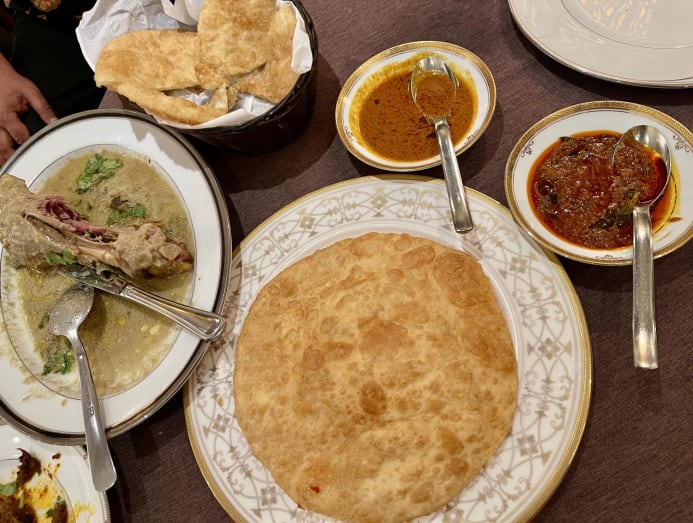
“So she accepted the invitation. After she passed away, we named it after her. Roti Mariam,” Mr Kalil explained. The rich bread boasted a blistered, cratered exterior and airy, absorbent interior, perfect for mopping up all the juices from the mutton samma.
It struck me that Islamic Restaurant’s enduring success is as much a reflection of its food as it is the family running it. Leading the charge in preserving his family’s history, Mr Kalil is a tour-de-force of interests and creative ideas. The intimate two-storey space is adorned with heirlooms he has collected through the years.
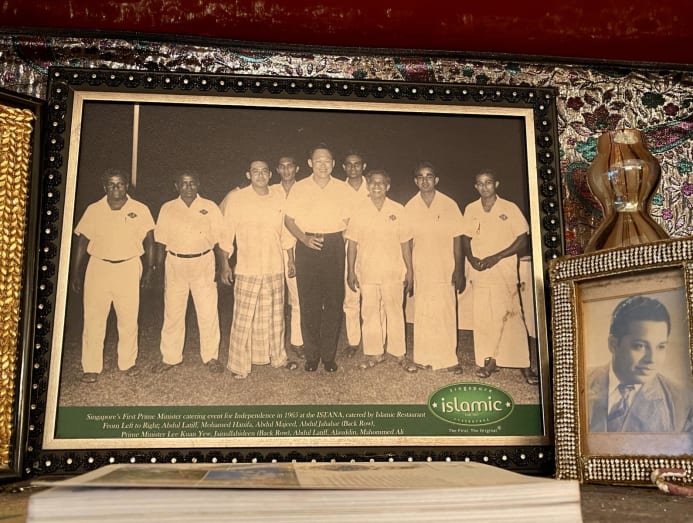
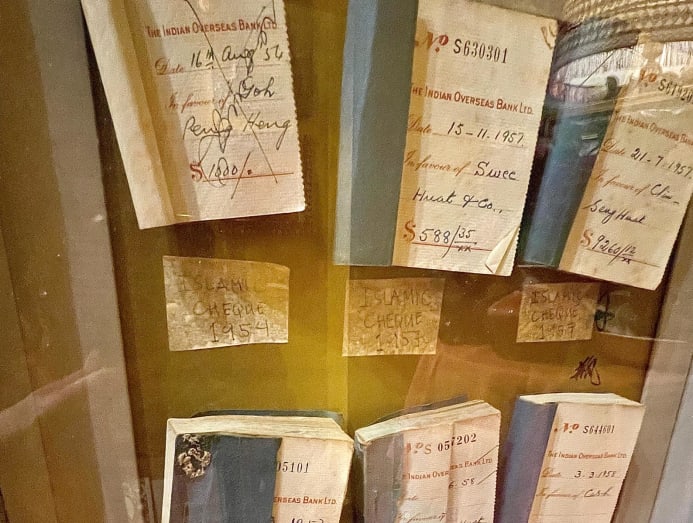
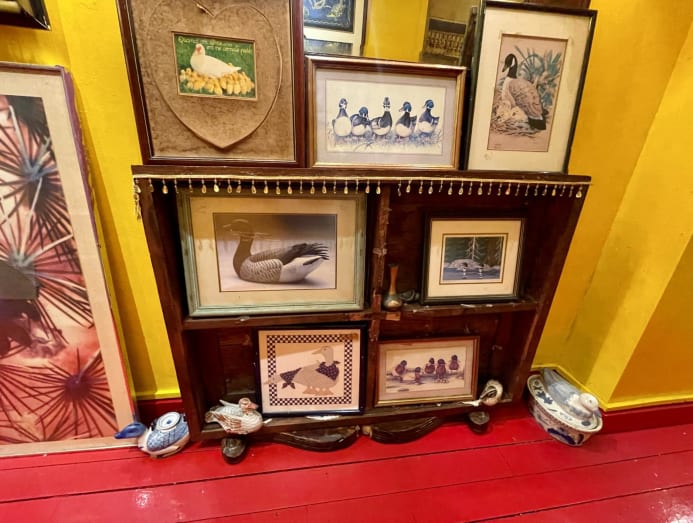
Mr Kalil’s great-grandfather was a wrestler whose photo hangs in the dining space, along with one of his bodybuilder uncle. His own trophies from younger days as an avid bodybuilder are also on display, along with vinyl records and musical instruments to commemorate his father’s talent for songwriting and his love for singing.
The upstairs room functions as both private event space and museum, whimsically decorated by Mr Kalil and his wife. Indian saris, European lace, French mirrors and oil paintings are eclectically displayed, vignettes of Singapore’s colonial history and their family’s place in it.
Mr Kalil’s collection of antique sahan (large Turkish serving dishes) take pride of place, for they once belonged to his grandfather. “This one is from Holland, which is almost 80 years old. So normally what we serve in here is the big granddaddy of biryani, actually shared by four persons,” he revealed.
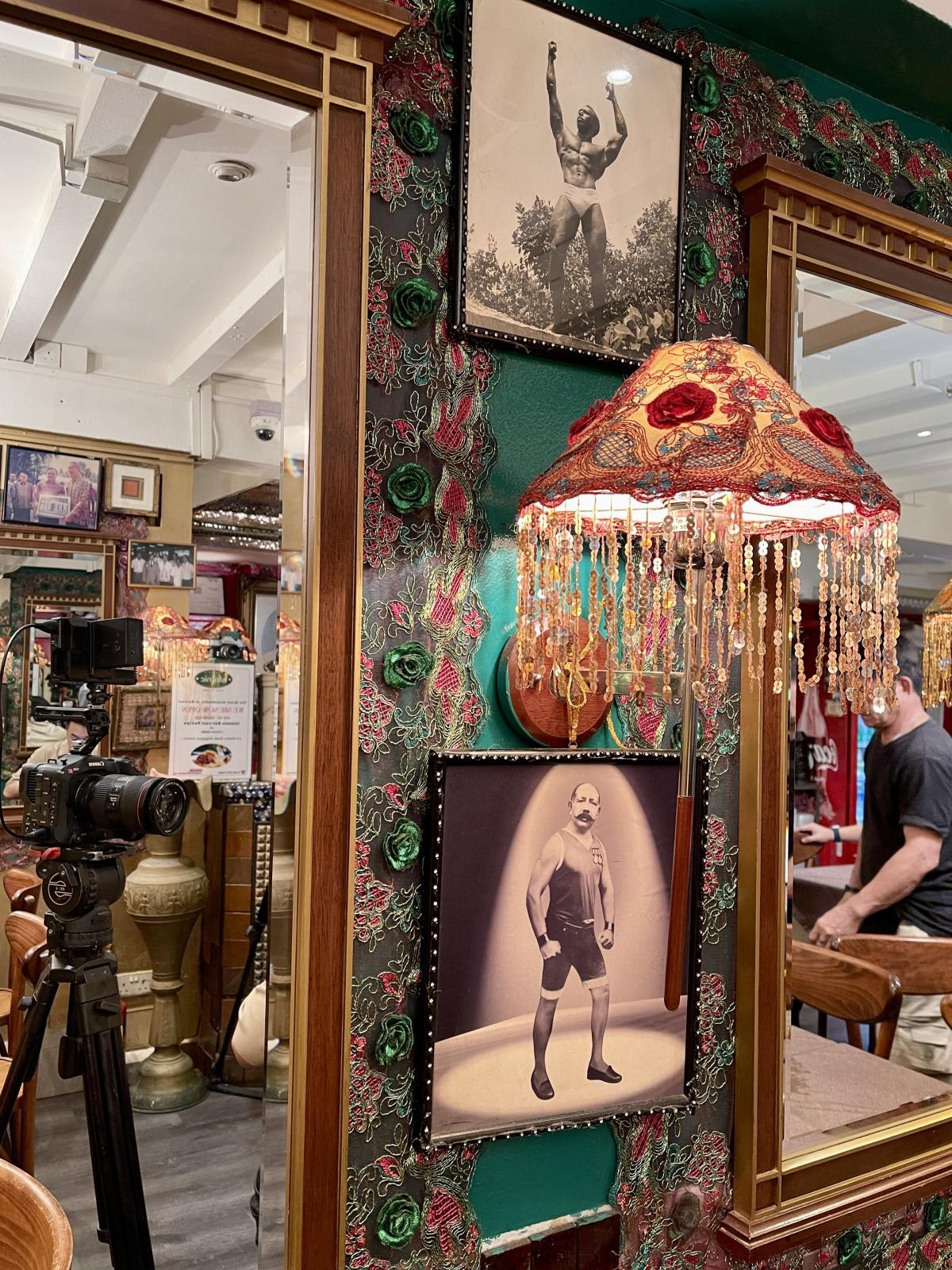
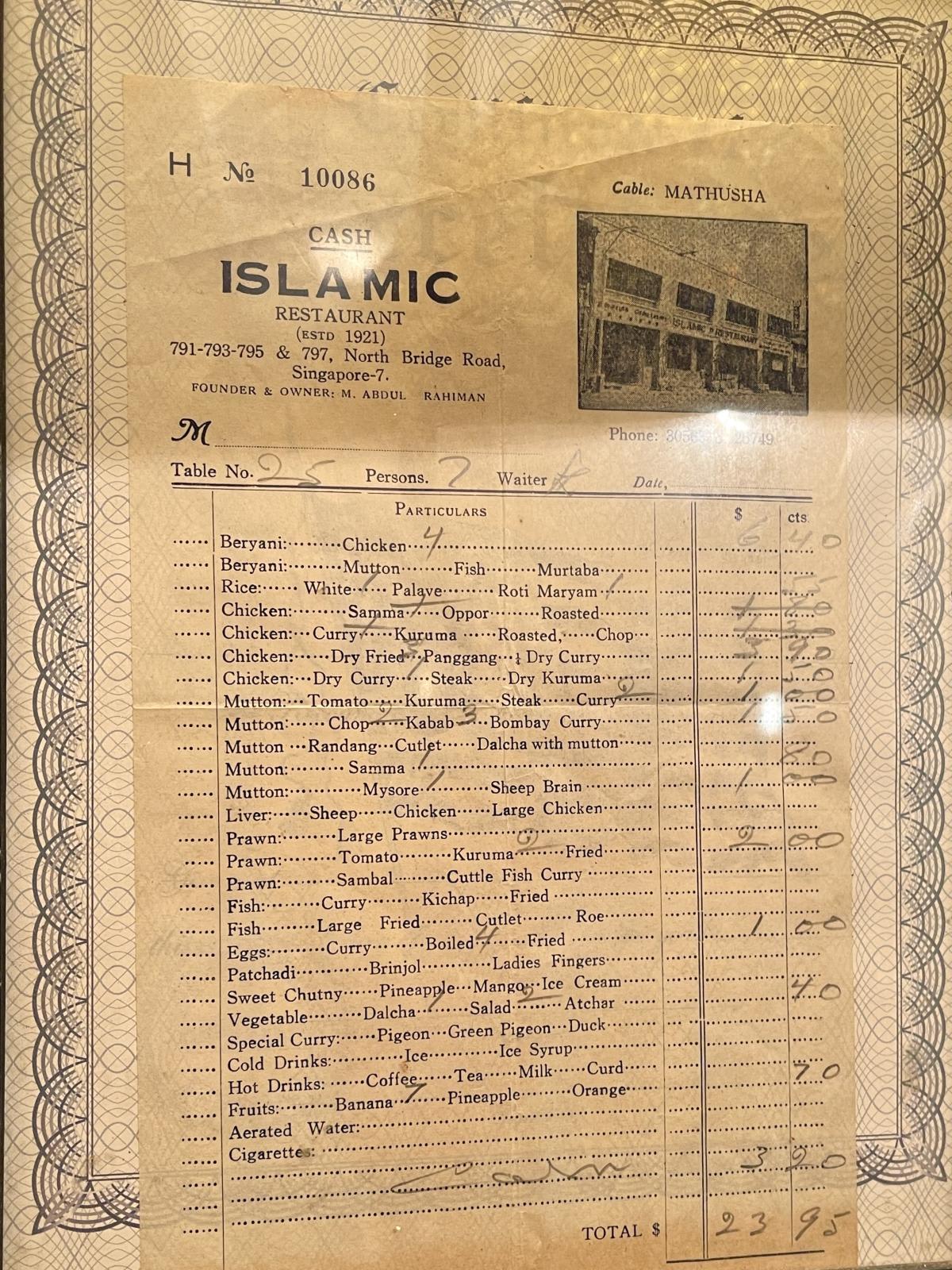
Catering on a larger scale for private events was a strategy spearheaded by Mr Kalil’s grandfather. “Because from the early stage in the 1920s, we had a lot of British influence in Singapore. We were one of the main corporate caterers for Europeans. So my grandfather built up the concept,” he explained. Jostling for real estate on the walls are photos of such functions, featuring VIPs, dignitaries and even our first Prime Minister at the Istana in 1965.
“This is a walk-in museum customers can enjoy. I want to preserve this iconic brand, together with my grandfather's artifacts,” Mr Kalil said, sharing his plans to engage an international museum curator to help organise his collections by next year.
Mr Kalil also believes that ready-to-cook and ready-to-eat products are the way forward, so R&D is well underway to replicate his family’s recipes consistently to a high standard. “This is the future, which I feel is more efficient. And if you want to go global, you cannot be opening restaurants all over the world. So with these products, we can export,” he disclosed.
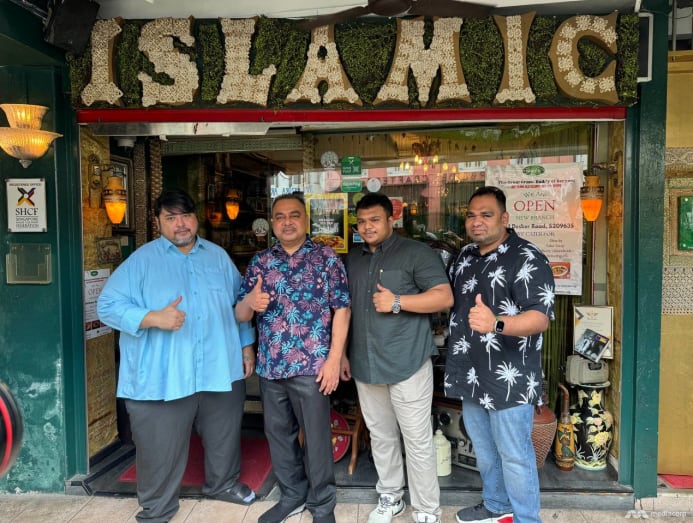
Efficiency in his kitchens with the aid of high-tech, automated equipment has also been crucial for expansion across the catering and home delivery divisions of the business, as well as a year-old branch in Desker Road. Mass production has made other dreams like giving back to the community possible. To celebrate the restaurant’s anniversary this year, Mr Kalil organised a food drive, giving away 3,103 portions of their signature chicken biryani for free.
Succession plans might continue as far into the fifth generation, with Mr Kalil’s son already involved in the business and his nine-year-old grandson helping with dishwashing on Saturdays “to learn”. Interestingly, Mr Kalil also collects replicas of ducks because they are social creatures that travel in groups. Perhaps his hope is, just like his favourite animal, his family will join him on the journey set in motion by his grandfather over a century past.
Allauddin’s Briyani is located at Tekka Centre, 6665 Buffalo Rd, #01-232 & #01-229, Singapore 210665. It’s open daily from 8am to 8pm.
Islamic Restaurant is located at 735 North Bridge Rd, Singapore 198703. It’s open daily from 10am to 9.30pm.
Catch Makan Kakis with Denise Tan every Thursday from 11am on MediaCorp GOLD 905.






